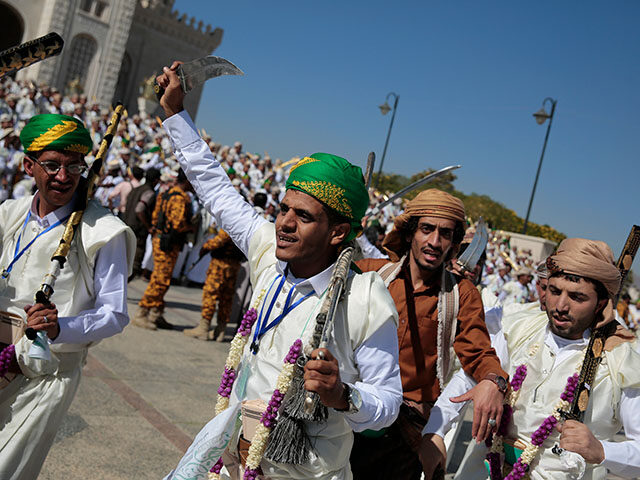The Iran-backed Houthi terrorists of Yemen have apparently decided music and singing will no longer be tolerated in areas under their control.
Social media videos show armed Houthi fighters barging into over a dozen wedding halls over the past few weeks and kidnapping the owners, as well as musicians hired to perform at the events.
The Houthis are radical Shiite Islamists whose preferred name for themselves is “Ansar Allah,” which means “Army of Allah.” Their official slogan is “Allahu Akbar (our God is the greatest), death to the United States, death to Israel, curse the Jews, victory for Islam.”
The Houthis are followers of a minority sect of Shia Islam known as the Zaydiyyah, whose doctrines are actually quite antithetical to Iran’s brand of Shia in several key respects, although both the Houthis and Iranians seem content to set those theocratic differences aside for the time being. Adherents of Zaydi Islam believe they are noble fighters against “corruption,” following in the footsteps of Zayd bin Ali, a revered descendant of Muhammad.
International media coverage rarely dwells on the Houthis’ religious extremism or their many crimes against humanity — among other offenses, they use child soldiers — instead focusing on the ethnic aspects of the Yemeni civil war, and of course the Houthis’ role as an Iranian terrorist proxy as they launch constant attacks on civilian ships in the Red Sea.
Even those versed in Houthi ideology professed confusion over the strange new jihad against wedding music, which does not appear to have been formally announced as either government policy or a religious crusade.
The Jerusalem Post reported on Monday that hiring wedding singers suddenly became a “crime” overnight and up to 40 people have been whisked off to “pretrial detention” for committing it. The man behind these abductions seems to be a new governor in the northwestern territory of ‘Amran named Nayef Abu Kahrafsah:
Yemeni bloggers launched an online campaign titled “Why were they imprisoned?” in reference to the odd circumstances of the artists’ arrests.
One user wrote for instance, “Why did they imprison them? Are ISIS members hiding inside the oud [a musical instrument]? They deliberately spoil even the joy of weddings and turn them into sadness and tragedy. If they were keen on the people’s money that they plundered and built villas with, this would not be forbidden.”
Another user wrote: “But why do they imprison artists in ‘Amran? Are their voices too loud? Do they not know how to play an oud or anything? Is ‘Amran a state that has a special law that differs from other regions?”
These Yemeni bloggers pointed out that Abu Kharafsah himself has been seen attending weddings that included musical performances, leading to a colorful accusation of hypocrisy from Arab media: “What is halal to them is haram to others.”
The Houthis have been hostile to music at weddings in the past but usually only in sporadic outbursts, while the current campaign of abductions and “pretrial detentions” seems like a determined effort. Some observers suggested it is simply a new way for the Houthis to terrorize their subjects into submission and to make themselves seem more pious – at least more pious than al-Qaeda, which is competing with the Houthis for influence in parts of Yemen.
“This is one of a series of measures taken by the Houthis by which they sought to enforce their interpretation of religious and moral codes on others. The closing of cafés, restaurants, and other public entertainment places, the detention and arrest of artists, and the cancellation of cultural events and artistic activities – all of these were practices essentially no different from those that al-Qaeda militants attempted to do in the past in Yemen,” noted Forum for Regional Thinking research fellow Inbal Nissim-Louvton.
Nissim-Louvton noted that the Houthis aggressively promote music that “glorifies” their movement, their war against the legitimate government of Yemen, and their battlefield successes, and they profit from the sale of such music. She described the Houthis as becoming more grim and Taliban-esque as they seek to burnish their extremist religious credentials and look more hardcore than their al-Qaeda competitors.
Let it not be said that Yemen’s Taliban wannabes are completely lacking in rhythm or humor. A pro-Houthi “comedian” in Yemen named Mustafa al-Mumari regaled his 2.86 million YouTube subscribers in June with a knee-slapping comedy song called “Ship Ship” that mocked Israelis and Westerners for worrying about Houthi missile attacks on Red Sea shipping:
“Since the start of the war, the Houthis have released numerous songs. Their official channels feature various religious anthems intended to ‘boost the spirits’ of their fighters. While they support music to some extent, their endorsement seems selective,” Ynet News dryly observed, nodding to all those wedding singers currently languishing in Houthi dungeons.

COMMENTS
Please let us know if you're having issues with commenting.